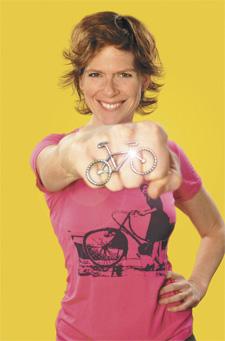Evalyn Parry wants to take Rob Ford for a ride.
The queer musician and theatre artist is fervently hoping the new mayor of Toronto will attend her musical performance piece SPIN, which premieres at Buddies March 15.
“I bet he’d enjoy himself,” she says, on a break from renovating the Parkdale home she recently purchased. “I’ve called his office to invite him, but I’m still waiting to hear back.”
Getting the man in charge to turn up isn’t just about demonstrating his support for the arts. It would also be a chance for him to learn more about one of Parry’s other passions — cycling.
“I want Ford to understand that cars and bikes have to coexist in the city,” she says. “I have no interest in fighting a war on cars. I realize they are here to stay. But encouraging more Torontonians to cycle safely would be so good for the health of our city, improving our physical health, our air quality and reducing traffic congestion.”
Created in collaboration with musicians Brad Hard and Anna Friz, as well as director Ruth Madoc-Jones, SPIN explores the bicycle as both means of transportation and tool of political emancipation.
The show tells the story of Annie Londonderry, an early feminist icon and cycling pioneer.
“She made a bet with two men she could cycle around the world, funding her trip entirely by money she made along the way,” Parry says. “She ended up selling advertising space on her body, making her the first example of women and sports endorsements.”
The piece also explores Parry’s breakup with her first girlfriend, which was directly connected to her passion for cycling.
“I was fresh out of university and she was much older,” Parry says. “One of the main points of contention in our relationship was that she didn’t understand why I wanted to ride a bike. She was always offering to drive me around or pick me up and put my bike in the trunk of her car. She was trying to do me a favour, but it felt like she wanted to control my autonomy.”
They eventually split, but not before the lady-friend bought Parry a new bike, one of the few things she kept when she moved back to Toronto from Montreal. In an ironic twist, that bike was swiped one night while she was having a romantic dinner with the woman who would one day become Parry’s wife.
“Having your bike stolen is about much more than the economic reality of having to replace it,” she says. “It’s an object you have a deep psychic connection with. Having it ripped away from you can be devastating.”
Not only is the bicycle at the centre of both stories, it also serves as the primary musical instrument in the show. Parry and Hart have rigged a rusty 1972 CCM Galaxy with contact mics, which capture sound from the timeworn two-wheeler.
“We use sounds that originate from the bike when it is brushed or tapped and then manipulate them using effects pedals,” she says. “The seat was the most amazing discovery. It’s one of those old vinyl ones with springs that create a lot of reverb, and so it acts like the bass drum in the musical arrangements. We’ve also tuned some of the spokes to different pitches so that we can use them to make melodies.”
Parry’s work as a writer and actor will be well known to gay audiences. The Toronto native co-helms award-winning theatre company The Independent Aunties with Anna Chatterton and Karin Randoja, who most recently turned out the self-help nightmare Breakfast at Buddies in March 2010. She’s also appeared in several of Ecce Homo’s works, including a turn in The Pastor Phelps Project as fag-hating Christ-crusader Shirley Phelps-Roper. The show drew international attention when it premiered at SummerWorks in August 2008, after members of the Westboro Baptist Church, which the play mocks, announced they would come to Canada to picket the event. Though the Phelpses failed to show, the resulting publicity made the play a massive hit.
Whether she’s writing a play or recording an album (she has three full-length discs on the market and a fourth being released at the opening of SPIN) politics are at the centre of everything Parry does, even riding her bike.
“Cycling is one of the best examples of how the personal is political,” she says. “It’s an individual activity, but it follows that ‘Many drops of water make the ocean’ sentiment. It questions how we relate to the geography of our city, our environment and our health.”
“It’s also an economic necessity for a lot of people,” she adds. “Most of us who ride can’t afford a car or even public transportation. Toronto is a tough city to be poor in and a tough city to be an artist in. Riding a bike is a big part of what makes it economically possible for a lot of us to do what we do. It would be great if our city council would acknowledge that by building proper bike lanes.”


 Why you can trust Xtra
Why you can trust Xtra


